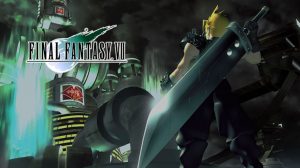If you’ve finished playing the Final Fantasy VII Remake, you’re likely thinking about the differences between the 1997 original and the latest iteration. Even if you’ve never played the original, you probably noticed that certain things seem to have been added or changed. While Final Fantasy VII Remake is a remake in various senses of the word, it’s undoubtedly a remake of the first section of the original game. As such, the rest of the story of the original will release in future installments.
So what does this mean going forward? First, I recommend playing the game. Just in general. It’s a great game. But we’re getting into spoiler territory here, for both the remake and the original, so you may want to play them before you move on. There will also be spoilers for Avengers: Infinity War and Endgame, so watch those too. It’ll make sense in a moment.

Played the game? Good. Watched those movies? Great. Let’s talk about the ending of Final Fantasy VII Remake for a moment. Long story short, ghost-like Whispers, or Arbiters of Fate, show up throughout the game. Were these in the original? No, because they exist in the remake to preserve the narrative, or “fate,” of the original game. At the end, when Cloud and friends defeat the Whispers, destiny gets destroyed. This means that in the future installments of the remake, anything goes. It’s a bit like the ending of another popular piece of entertainment, Avengers: Infinity War. Bear with me for a second. Towards the end of the movie, the heroes seemingly defeat the evil Thanos. The story ends. Except in a game-changing move, he snaps his fingers and half the galaxy’s population gets wiped out. In Final Fantasy VII Remake, Cloud snaps his fingers (or swings his Buster Sword), and suddenly an entire timeline gets erased. Or does it?
While nobody knows what will happen in future installments except the writers of Final Fantasy VI Remake, it’s entirely possible they will stay true to the original’s narrative. There are two ways that I’ll put forth here. The first is through time travel. Now, we don’t know exactly how Final Fantasy VII Remake handles time travel, but we know that it does. In the remake, when you cast Assess on Whispers Rubrum, Viridi, or Croceo, the text will say that they’re entities from a future timeline fighting to protect the future that gave shape to them. As pointed out, each of these three Whispers resembles a main character of Cloud, Tifa, and Barret (or three characters from movie sequel Advent Children).
Either way, these three Whispers are characters from the future who went back in time to preserve the initial timeline. And since we defeat them in our playthrough, they fail in their mission. Unless time travel doesn’t work that way. In Avengers: Endgame, the heroes go back in time and fail to change the events of Infinity War on several occasions. Eventually, they get it right. Now I’m not saying that Final Fantasy VII will borrow time travel laws from Avengers, but it could work similarly.
What if in the future installment, players play this exact same battle from the point of view of the Whispers? When they win, the original timeline is preserved, with alternate timelines branching off. But even if their defeat at the end of Final Fantasy VII Remake is still guaranteed, how do we know that’s the only point in time they visit in order to preserve the timeline? While I’m not saying this will take place, I am saying that when time travel enters a storyline, it’s anyone’s guess as to whether a pre-established narrative will get reinforced or dismantled. At this point, the original timeline of Final Fantasy VII could go either way.
But I’d like to offer a second theory, one that doesn’t rely on time travel. Let’s say that Cloud and company really do defeat the Whispers, whether or not these are their future selves come to stop them. Let’s say that fate and destiny have gotten totally thrown out the window. No more Whispers. From here on out, it’s entirely up to their choices. But what if they follow fate anyways? In fact, what if they follow it on purpose? Even though the Whispers get defeated, Cloud and Aerith still have visions of what the future can potentially hold. It seems like even Sephiroth does, and he encourages the others to defy fate. Why would he do this? Because following destiny would spell his downfall, as it did in the original. In order to ensure that Sephiroth meets his end, the characters in the remake could still work to make sure that events play out as intended. With the Whispers gone, it would make for a challenge, but not an impossible one. There’s a fantastically well-researched thread on Reddit arguing that Aerith has awareness of the full plot and actively works to keep the timeline more or less intact. She’s the Doctor Strange of this game. In Infinity War, when Doctor Strange looks into the future to see the trillions of possible outcomes, he mentions that there’s just one that will work. Handing Thanos the Time Stone, seemingly allowing Thanos to carry out his plan, he makes the crucial remark, “there was no other way.” The heroes follow this guidance and chart the path through the one way that ultimately leads to Thanos’s downfall. For the future installments of Final Fantasy VII, the heroes could follow their own “one way,” the way of the original game, to defeat Sephiroth and succeed.
Now, you may ask, “why would the creators of Final Fantasy VII go out of the way to throw the timeline out the window just to stick to it anyway?” Well, let’s use an example we know the outcome of. Why would the writers of Avengers: Infinity War kill off half of the characters just to bring most of them back in Endgame? Simple. Because they don’t need the timeline to change, they only need people to believe that it can change. The concept of “all bets are off” makes for compelling narratives. If the Avengers found out at the end of Infinity War that they’d eventually come back and save the world, would people still have gone to see Endgame? Probably.
But the fact that their fate hung up in the air, even though many audience members correctly guessed that they’d succeed, made people want to know the answer even more. They wanted confirmation. In this case, they want hope. If people knew that Aerith would die in the next installment of the Final Fantasy VII Remake, would they still play it? Probably. But considering how controversial the decision was back in 1997 and even today, it makes sense for Square Enix to provide the belief in the possibility that she will survive, even if she doesn’t. If she did die the same way, many people would see it coming and prepare for the moment. The whole impact of the original was that nobody saw it coming.
So here’s a conjecture. Let’s say that Sephiroth doesn’t kill Aerith. Aerith lives. But in realizing that this will prevent the party from defeating Sephiroth, she decides to sacrifice herself later on. This would preserve the original story, but in more ways than one. It would also preserve the original intention of her death coming as a surprise. This is just one example, but there are various ways in which the future installments could alter certain elements slightly while still adhering to the core story. Even in the first installment, Final Fantasy VII Remake has certain side characters whose fates change while the main characters’ stay the same. Basically, in the second theory here, future games will provide different ways of telling essentially the original story.
Now, it’s worth reiterating that all of this is speculation. But for those who viewed the ending of the first part of Final Fantasy VII Remake as a guarantee that the original plot will get thrown out, I wanted to offer some reasons why it may not be. It’s worth noting that plenty of sequels involving time travel ultimately preserve the narratives of the original, with slight adjustments, from Back to the Future Part 2 to Harry Potter and the Cursed Child. They allow us to revisit stories we know and shed light on them from a different angle. In Avengers: Endgame, Thanos’s finger snap gets reversed to preserve the heroes’ main victory, although a couple of them do have altered fates. Now, the predictions here could turn out to be correct or utterly wrong. Maybe the story will stay the same, just not in one of the two ways outlined here.
While I wanted to offer some explanations of how it could stay true to the original, personally I actually do believe that the plot will differ. How much exactly? No idea. But that’s the point. That’s the excitement of it. The decision to remove fate from the game makes a guarantee of one thing and one thing only. From here on out, as far as we know, anything could happen. Even the very things we most expect, in ways we don’t see coming.





